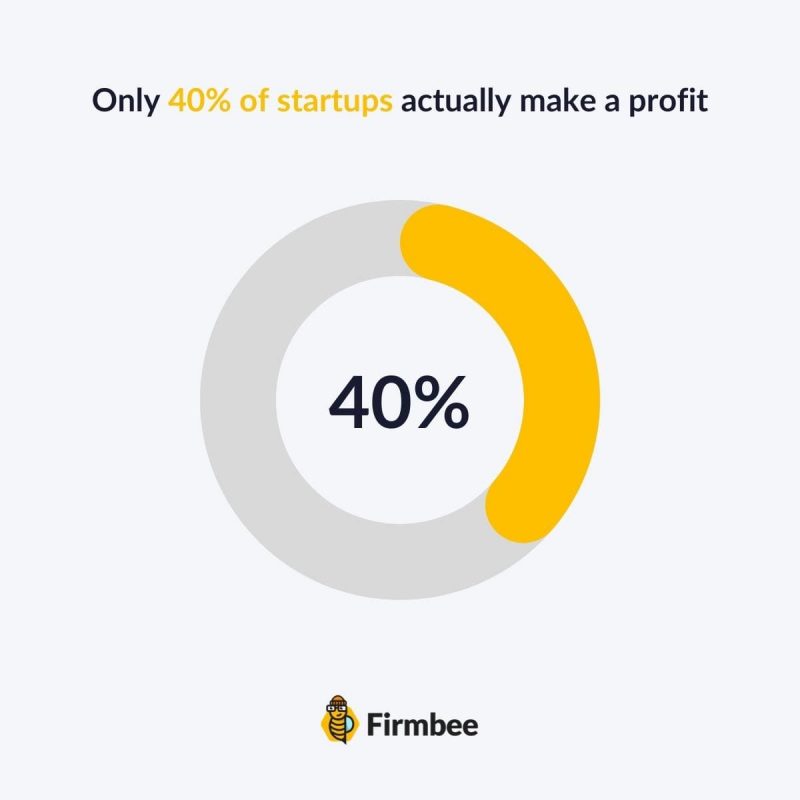Startups are commonly considered as risky business ventures. No wonder that most of them fail in the very first year of operation. However, what happens to those which survive? How much do startups and their founders make? How long does it take a business to be profitable? Read our article and explore general startup statistics.
Startup statistics – table of contents:
- Operating revenue vs. operating income
- General startup statistics
- How much do startup founders make?
- Is it normal for a startup to lose money?
- Summary
Operating revenue vs. operating income
Startup earnings are a difficult and touchy subject. However, it still needs to be tackled. Startups, after all, are young businesses that put a heavy emphasis on rapid growth in sales and profit. How to determine startup capital? First of all, you should know the difference between operating revenue and operating income. These are important accounting terms that will help you estimate your startup’s actual earnings.
Operating revenue is the total amount of money that is generated by the organization before any taxes and expenses are deducted. It’s the money that flows into your startup and comes from its core operations. Operating income, in turn, is the company’s profit after subtracting its regular costs. It’s useful to be familiar with those concepts when analysing general startup statistics.
General startup statistics
Various analyses and surveys show that only 40% of startups actually make a profit, and this shouldn’t come as a surprise since only one out of ten such organizations is able to endure in the long run. Only 30% of startups survive their tenth year in business. Another 30% of young companies reach a financial break-even point, and the rest of them aren’t profitable at all.
How much can a startup earn, then? Well, it’s not all sunshine and roses. Most startups don’t earn money for a long time. If they do, they usually make less than $100,000 a year. Only 9% of startups generate revenue exceeding $1 million.

How much do startup founders make?
Many people think that startup founders don’t earn anything, but only use their personal income sources to grow their businesses. In fact, there a many ways they can generate revenue. Most often, startup founders make money by selling products or services to customers, offering advertising space on their websites, and accepting investments from venture capitalists in exchange for shares.
Obviously, startup founders’ earnings vary a lot. Some business owners don’t earn money at all, while others enjoy hefty salaries. 66% of startup founders in Silicon Valley earn less than $50,000 per year, and in Europe the percentage of founders with such earnings is even higher. For instance, the average yearly salary for startup owners who raised less than $500,000 is $35,529. If a business took in between $5 million and $10 million, startup owners would get $62,150 per year.
Is it normal for a startup to lose money?
Most startups suffer losses in their first year in business. However, is it always a problem? It turns out that this is not necessarily a bad thing. Just because you take a loss doesn’t mean you are destined to fail. Startups usually take three years or longer to turn a profit. It’s no secret that companies focused on rapid development burn money incredibly quickly. There is nothing wrong with that as long as the path to profitability has been clearly mapped out.

General startup statistics – summary
Startups are organizations that can’t be valued on the basis of their current profits or losses. Their valuation depends on their growth prospects. The fact that your startup is not earning much at the moment, doesn’t mean that it won’t become a cash cow in the near future.
Other resources: Branding strategy for startups
If you like our content, join our busy bees community on Facebook, Twitter, LinkedIn, Instagram, YouTube, Pinterest.
Author: Andy Nichols
A problem solver with 5 different degrees and endless reserves of motivation. This makes him a perfect Business Owner & Manager. When searching for employees and partners, openness and curiosity of the world are qualities he values the most.
Launch your startup:
- What is a startup?
- Pros and cons of creating a startup
- 8 best industries for startups
- Top 5 skills every highly successful startup founder needs
- How to create a startup? 7 simple and easy steps
- 6 essential startup development stages
- How to create a startup growth strategy?
- General startup statistics you need to know
- Startup vs. corporate job. Which is right for you?
- 5 incredible companies that started in a garage
- How to find a business idea?
- How to check if your startup idea already exists?
- How to name a startup? Useful tips and strategies
- How to gain business knowledge quickly? 5 best practices
- Why do startups fail? 6 startup ideas you should avoid
- 5 weird business ideas that made millions
- Top 6 most profitable small businesses
- 7 questions to determine if your business idea is worth pursuing
- What is a buyer persona? 5 benefits of creating a buyer persona
- How to validate your business idea? 3 easy steps
- Should you follow your passion? The importance of passion in business
- What is market reseach and why is it important?
- Using social media in business
- What to do when you have too many business ideas?
- How to write a good problem statement for your startup?
- How to test your business idea for real?
- How to create a prototype for a product?
- How to build an MVP?
- How to use surveys for testing your business idea?
- 10 useful tools to validate your business idea
- What is a business plan? 4 types of business plans
- What should be included in a business plan?
- What should a product description include?
- Competitor analysis
- Marketing strategy
- Traditional business plan vs. lean startup plan
- Implementation plan. What is it and how to create it?
- Everything you need to know about patents
- Financial management for startups
- What permits and licenses does my startup need?
- What is the average startup founder salary?
- 4 startup taxes you need to pay
- Which legal structure is best for your business?
- Startup costs. How much money will you need?
- Protection of intellectual property in a startup
- Family funding vs. self-funding
- What is a shareholders’ agreement?
- What should a financial section of a business plan include?


















